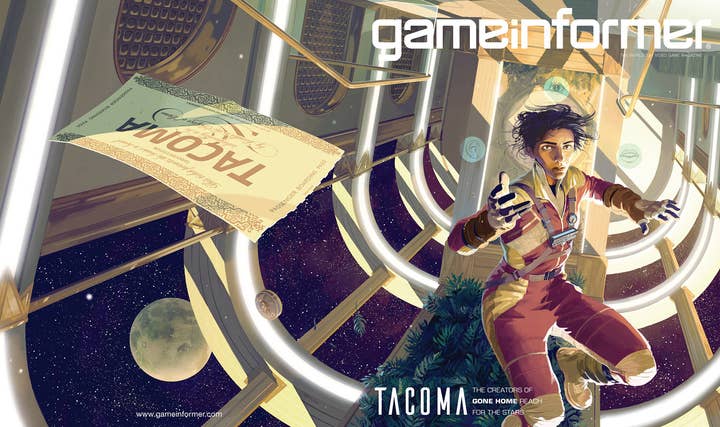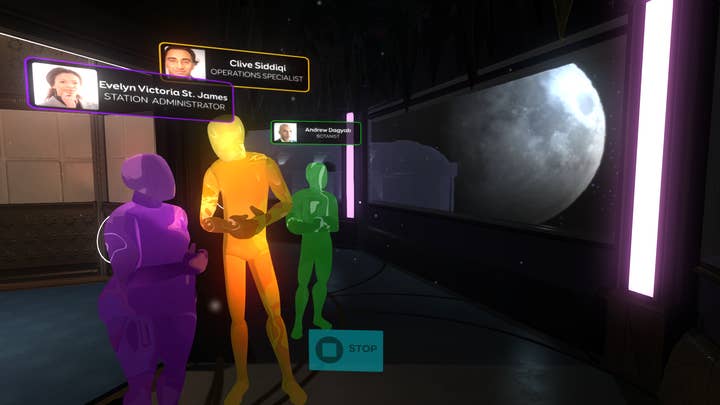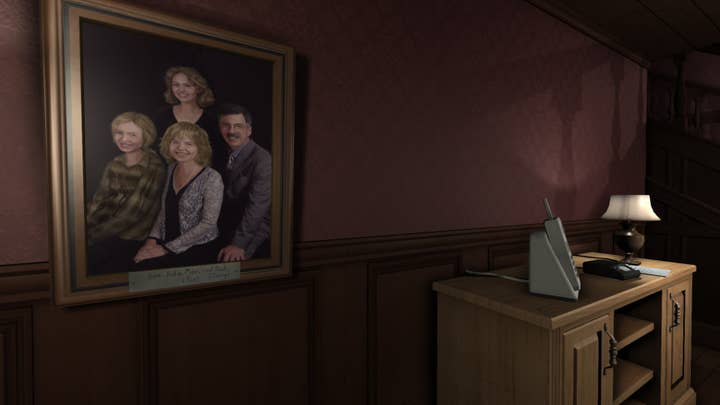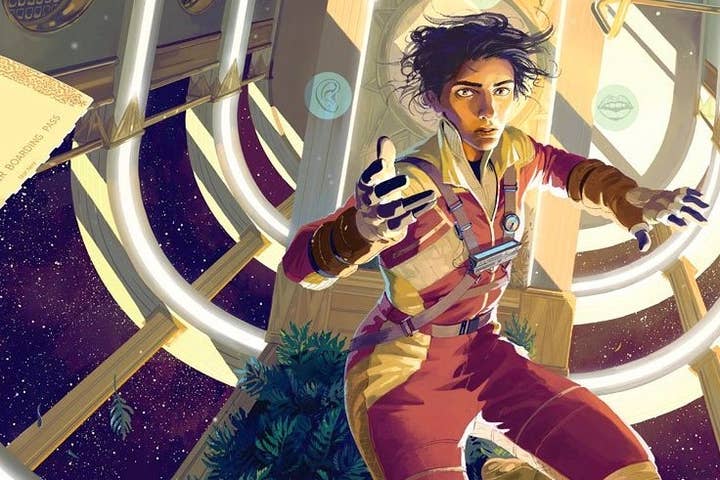Tacoma, Gone Home and the future of the 'walking simulator'
Fullbright's Steve Gaynor breaks down budgets, exposure and design
Coming out of the development on BioShock 2 DLC Minerva's Den in 2012, Steve Gaynor and the small team which formed The Fullbright Company was riding on a high. They had the international attention of having worked on something high profile as well as the cachet of making something different, something interesting and new in a hugely crowded space. They were also forming a new studio at a time when the prospects for talented indies had never looked so rosy. At the time, Gaynor acknowledged the benefits of this pedigree, but with the release of Gone Home in 2013, Fullbright earned itself a swathe of critical acclaim all of its own.
Now, the still small studio is gearing up for its second release: Tacoma. Sticking with the narrative-driven experience which established the studio's fame, Gaynor's team has found an audience even more attentive than it was two years ago, with Tacoma landing a front page feature on GameInformer magazine just weeks after Gaynor himself was onstage for Microsoft's glitzy and superb press briefing at E3. But with attention comes pressure, and now Fullbright has to deliver. We talked to Gaynor about that shift in expectations, what it means for Tacoma and the future of a genre he helped to establish.
Does the recent upswing in your exposure, being on the stage for Microsoft at E3 and on the cover of GameInformer, represent a change in attitude towards indie developers and the profile they can build?
"I think it really depends. Just a couple of years ago we, our particular team, was in a very different position. Even then we particularly were in a very different position than a lot of indies who were just starting out because we had come from AAA. We have press contacts, the pedigree of saying that we'd worked on BioShock etc, it put us in a different place than a lot of indies start from.
"But I feel that there was a big shift in the placement of indies in the industry overall back in the Braid days, with things like Limbo. I think that from that point forward a dev's first game that breaks out can give them a lot more opportunities for the next game. Bastion meant that Transistor was on the Sony stage, Braid got Jonathan Blow on stage for The Witness. That's been happening for a few years. So I think it's the continuation of that cycle.

"That said, it's true that Tacoma has been one of the first ever indie games on the cover of GameInformer, which is the biggest print publication in the industry. So if anything I guess I'd say it was a shift by degrees rather than a seachange. If anything I think we might be seeing something of a shift back in the opposite direction in some cases. At E3, in Sony's press conference, there was a swing back towards almost entirely bigger announcements, it seemed to me that there was very little indie stuff, compared to a couple of years ago, when they really leaned on the whole 'PlayStation as the home of indies' stuff.
"Firewatch and No Man's Sky seemed like the exceptions rather than the rule. I think a lot of it is a question of what the particular platform is looking for at that moment. Microsoft is looking for ways to stand out compared to the PS4, indie titles are a great way to say 'look at all these interesting, unique things that are on our platform.' Who knows if that story would be the same if Microsoft was in the same position it was last generation.
"The way that platforms try to associate themselves with indie games has definitely become a very interesting indicator of what their goals are at that particular time. Sony almost certainly looked back and saw when XBLA had all these highly acclaimed indie titles at the height of the Xbox 360, that was a big stand out point."
Are you fully prepared for the impact of the extra publicity? Gone Home was popular, but this is a step change. Hello Games were surprised by the extra pressure which No Man's Sky's exposure put on them.
"The way that platforms try to associate themselves with indie games has definitely become a very interesting indicator of what their goals are at that particular time"
"I think that they're still in a different position to almost anyone else in the industry. I read about their E3 experience and they were doing private demos for Steven Spielberg and Kanye West... That's a different thing, we don't have that!
"But I feel alright about the exposure. I feel fortunate that myself and the others on my team have all worked on big games before and have at least been in the splash damage radius of big press pushes for things like BioShock 2 and Infinite, or Dishonored. We still have to do a good job and deliver on the promise, but having had a lot of long term exposure to that realm before makes it feel a lot less viscerally terrifying. A lot of the reason for that being scary is that it's an unknown. 'What happens if it doesn't do well, if we don't live up to it?'
"So you have to do well, you have to ship the thing, you definitely have to think in terms of looking at the game from an outside perspective. You're signing up to have to do a good job at what you've set up people's expectations for, and I guess that's where something like No Man's Sky might be more daunting: people are really excited for it, but they don't quite know what it is.

"When you're trying to deliver something which will be the first answer to 'what even is this thing', that's hard. With us, we always try to work within very tight constraints. The game is, you're going to walk around this place and some interesting stuff is going to happen. We at least try to give ourselves hard questions to answer within a space that we know is within our grasp. Hopefully as long as we can get enough people to pay attention and make something we're proud of, it all works out."
After the success of Gone Home, were you tempted to make Tacoma for a broader audience, to sacrifice any vision for further reach?
"I think it's a question of what you're picturing when you say 'the audience'. I think Tacoma, just by virtue of being in a more fantastical setting than Gone Home was, has a more easily accessible appeal to the more established game playing audience. But, when you're talking outside of that, Gone Home may have a broader conceptual appeal to an audience that aren't necessarily already versed in games and attuned to what games ordinarily deliver. It has less complexity than Tacoma because of the zero-G navigation stuff, and it's also more relatable, I think, fiction wise. It's a family house, you can connect with those people more easily.
"So on the one hand we wanted to make Tacoma a near-future sci-fi game because we wanted to push ourselves to not be repeating ourselves and making another game set in another real time and place. So the challenge now is to have to imagine the context of the world that we're creating and imagine how the specifics of the characters we're creating, and the station itself, fit into the cumulative fiction that we have to create, or extrapolate from the present. So the impulse was to do something different for our own creative purpose, to explore a different part of how we do world building and express what a place is about. That may turn out to be a better fit for a larger portion of the game playing audience. I guess that's fortunate.
"That may turn out to be a better fit for a larger portion of the game playing audience. I guess that's fortunate."
"I think we're just trying to do something different and surprise ourselves every time we make a game. I don't know what would come after this - we've explored a couple of different versions of what we can do as a studio, but who knows what comes after Tacoma."
Both games lack traditional NPCs, instead embracing the idea of vicarious presence, echoes, experiencing what people have left behind. Is that a choice to change the way people perceive their actions?
"Some of it is down to the interactive role that you play. One interesting thing you can have a player do when they're not having an impact on the events of the game in realtime, in the present tense, when you're not saying 'there are enemies here, eliminate them' or 'there are characters here, choose a story branch', is that you can take on this detective role, an investigator. Not having the characters there in front of your face to explain what's going on, to tell you what's happened or is happening, when the player is left alone to collect evidence, requires the player to try to piece it all together in their own heads. Nobody is there to confirm or deny what you think is going on. I think there's something really interesting there that speaks directly to a video game player's experience in a way that I don't think other media can focus on as much. It's an interesting opportunity to do something unique with interactivity.
"The other side of it is just very practical. We're a very small team and we want to focus on character building and world building and storytelling in a way that's unique to games. We know how much it takes to make a convincing AI character follow you around, or make a performance character seem like they're really in the world with you, so we're really answering the questions that we're interested in, in a way that also sidesteps the hard challenges of the uncanny valley of character representation and behaviour.

"The reason there were no characters in Gone Home was that it's expensive. We didn't have a character artist. We knew we couldn't afford one. So we started from that point of saying, 'if we don't have any characters in the game, what's the game?' Even when the baseline motivation is 'we can't afford that', it still has to come across as the game being about something which makes that decision interesting."
Both games seem to feature the ghost of the supernatural - in Gone Home there was this idea that things were going to take a horror turn, but never did. Tacoma seems like it could go down that route, too. Is confounding people's expectations like this a continued theme?
"In Gone Home that was an acknowledgement of something that emerged from development rather than a conscious decision from the outset. And I think that works with what you were saying about isolation being a key element of both games. I think when you leave a player completely alone within a contained environment, you start from a place where that's an inherently creepy place to be in. You kinda have to work your way out of that somehow. With Gone Home we had, not just the fact that you're alone, but you're also in this creaky old Victorian mansion. We needed that as a way for the game to have enough space for the player pathing that we wanted and so you don't feel like you should just be able to walk out the front door any time you like: it's the middle of the night in a terrible thunderstorm. We put you in a space where it's not the player's fault to assume that this is a horror game.
"From there, we have acknowledge that we know what your assumptions are, we acknowledge that they're reasonable and our fault. Then we have to pull you along this spectrum to smoothly realising that this isn't actually what that experience is about by the time you get out of the other end. Hopefully that doesn't feel jarring or manipulative, because it was actually a problem that we were solving, rather than a misdirection that we'd intentionally set up.
"Similarly in Tacoma, you're all on your own in an abandoned space station in the middle of the void. That's a start that says something bad has happened here. I'll be honest and say that we don't actually yet know what the full arc of the story and the player experience is going to be - we write the game and build the narrative as we go, but I think that something which is important about a game like this is that you're playing a role within the fiction - you're playing a specific person who is in a place for a specific reason and that place has to be in the state which it's in as a justification for why you're there and nobody else is. All of that stuff sets up a mystery. That mystery is never going to be that one of the crew members went crazy and killed everybody - that's just not exciting to us - but whether something legitimately bad happened to the crew is kind of up in the air at this point. We never want to feel like we've gone the cheap route. I don't that ever ends up being very satisfying. What is satisfying usually ends up being more subtle, more mundane, but surprising because of what else you've learned."
"I'll be honest and say that we don't actually yet know what the full arc of the story and the player experience is going to be - we write the game and build the narrative as we go"
It seems like there's a definite distinction between games with a story and games which are a story, with your work falling into that second category. Would you agree with that?
"That's an interesting way of stating it, I hadn't thought of it that way - that the game's job is to tell the story rather than just the game having a story. There's been a few. The Vanishing of Ethan Carter, What Remains of Edith Finch, Everybody's Gone to the Rapture, Adrift. There's been a proliferation of that, this idea of, if you take out the shooting out of an FPS, what is the interesting thing that you're doing? Is it finding story, or trying to survive, or making your way between puzzles and trying to discover what the world is? I think that it's a very broad genre. It's more a design question.
"These games are all held together very loosely. I think we're seeing this feeling that there's a lot of legitimate design territory to explore there. It's cool to see more and more people asking that. There are a lot of different answers to a similar set of design impulses. In some ways it's a reaction, but it's only a reaction inasmuch as people are saying, 'we've been playing these FPS games for so long, there's so much potential to do other things with them. That's pretty rad.'
"It's sort of been one big continuum, but we were definitely looking at Dear Esther as an example of what we could do, the sort of game we wanted to make that was just about story. I think we're just now seeing that on a bigger scale too - the gatekeepers, the platform holders, the press, are seeing that these games are getting more exposure so now they have the confidence to support them early on in development. They might not have done that a few years ago. It's great that this is supporting projects like Everybody's Gone to the Rapture."

